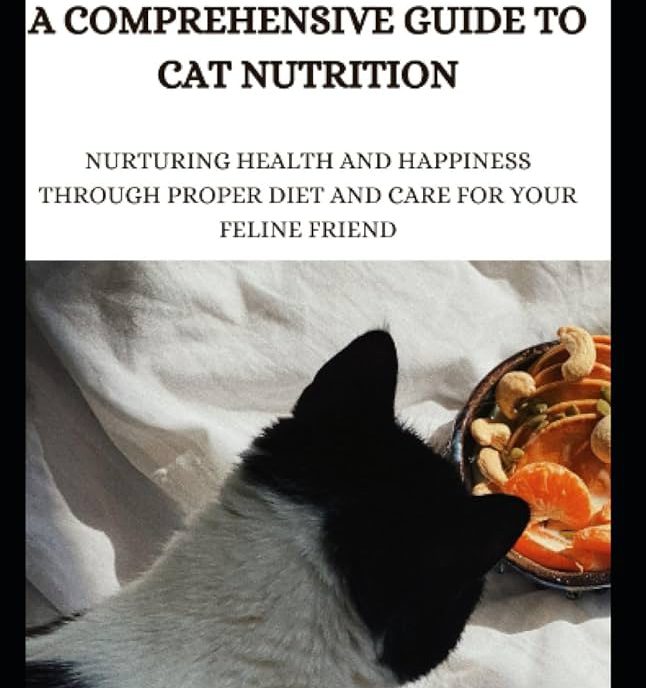Cat Health and Diet: A Comprehensive Guide

Cats are unique creatures with specific dietary and health needs. Understanding how to care for your feline friend is crucial for ensuring their well-being. Here’s a detailed guide to help you provide a healthy diet and maintain your cat’s health.
1. Understanding Nutritional Needs
Cats are obligate carnivores, meaning their diet must be primarily made up of animal-based protein. Here are the essential nutrients your cat needs:
- Proteins: Essential for growth, maintenance, and energy. Look for high-quality animal protein sources like chicken, turkey, fish, and beef.
- Fats: Provide energy and help with nutrient absorption. Healthy fats, such as those found in fish oil, are beneficial for skin and coat health.
- Carbohydrates: While not necessary, some carbohydrates can provide fiber for digestion. However, cats have a limited ability to digest carbs, so they should not make up a large portion of their diet.
- Vitamins and Minerals: Essential for overall health. A complete and balanced commercial cat food will usually meet these needs, but supplements may be necessary in specific cases.
2. Choosing the Right Cat Food
When selecting cat food, consider the following:
- Life Stage: Kittens, adult cats, and senior cats have different nutritional requirements. Choose food formulated for your cat’s specific life stage.
- Quality Ingredients: Look for high-quality cat foods that list real meat as the first ingredient. Avoid those with fillers, artificial colors, or preservatives.
Types of Cat Food:
- Dry Kibble: Convenient and can help maintain dental health through crunching. Ensure it’s high in quality and appropriate for your cat’s needs.
- Wet Food: More palatable and hydrating, wet food can be beneficial for cats that do not drink enough water. It is often richer in protein and moisture.
- Raw Diet: Some owners opt for a raw food diet, which includes raw meat and organs. This requires careful planning to ensure nutritional balance and safety.
- Home-Cooked Meals: Can be tailored to your cat’s needs, but should be formulated with the help of a veterinarian to avoid nutritional deficiencies.
3. Portion Control and Feeding Schedule
- Determine Caloric Needs: Consult your veterinarian to calculate your cat’s daily caloric needs based on age, weight, activity level, and health status.
- Feeding Frequency: Adult cats can be fed twice a day, while kittens may require 3-4 meals a day. Regular feeding times help establish a routine.
4. Healthy Treats and Snacks
- Healthy Treat Options: Choose low-calorie treats like freeze-dried meat or catnip-infused toys. Treats should not exceed 10% of your cat’s daily caloric intake.
- Avoid Harmful Foods: Some human foods can be toxic to cats, including chocolate, onions, garlic, grapes, and alcohol.
5. Regular Exercise and Mental Stimulation
A balanced diet is just one aspect of your cat’s health. Regular exercise and mental stimulation are also crucial:
- Playtime: Engage your cat in interactive play using toys like feather wands, laser pointers, or toy mice. This keeps them physically fit and mentally stimulated.
- Scratching Posts and Climbing Structures: Provide appropriate outlets for scratching and climbing to promote natural behaviors and exercise.
- Puzzle Toys: These can challenge your cat mentally and provide rewards for their efforts, encouraging problem-solving skills.
6. Routine Veterinary Care
- Regular Check-Ups: Schedule annual veterinary visits for vaccinations, dental care, and general health assessments.
- Weight Management: Regularly monitor your cat’s weight to prevent obesity, which can lead to various health issues such as diabetes and joint problems.
- Dental Health: Oral care is important; brush your cat’s teeth regularly and provide dental treats to promote oral hygiene.
Conclusion
Providing your cat with a balanced diet and a healthy lifestyle is essential for their overall health and happiness. By understanding their nutritional needs, choosing high-quality food, and incorporating regular exercise and veterinary care, you can ensure that your feline companion lives a long, healthy, and fulfilling life. Always consult your veterinarian for personalized dietary recommendations and health advice tailored to your cat’s specific needs.



